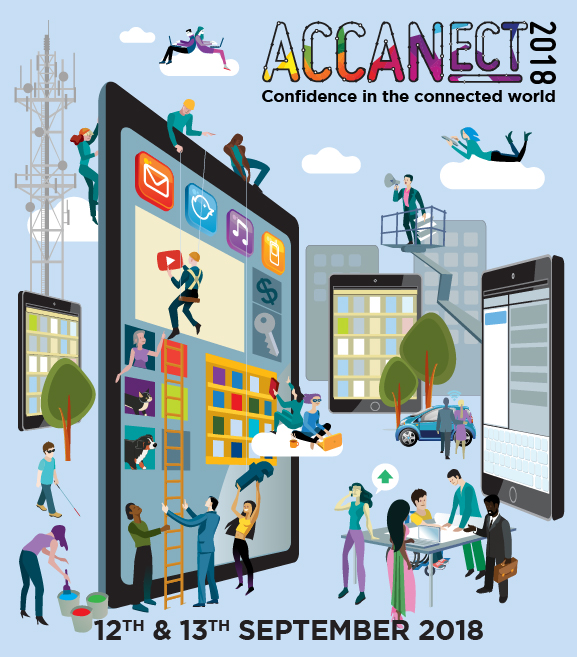- Details
ACCAN has made a submission to the Australian Human Rights Commission’s Human Rights and Technology consultation.
The issues paper asked which human rights can be affected by technology, and what issues technology can raise for different groups of people. The issues paper included some questions that specifically related to people with disability and the accessibility of technology, including what challenges and opportunities people with disability experience when accessing technology and how the development and use of more accessible technology can be encouraged and promoted in Australia.
ACCAN focused on the human rights of people with disability in our submission. We made the following key points:
- Details
ACCAN has made a submission to the Australian Competition and Consumer Commission (ACCC) Facilities Access Code consultation.
The discussion paper asked whether improvements could be made to the code which provides a process for carriers to access each other’s infrastructure, co-locate equipment and co-build facilities in order to reduce the cost of providing services and protecting community amenity through duplication of infrastructure. The code also provides voluntary consultation and negotiation processes for carriers as well as a framework for dispute resolution in the event that they cannot agree on access arrangements.
Although the code has been largely successful in promoting co-location and reducing duplication, there are indications that in regional areas it has been less effective. There are also some indications that carriers may have incentives to preclude access or co-location where there are commercial advantages to doing so.
ACCAN made the following key points:
- Details
The summary below outlines ACCAN's activities from 1 March – 31 May 2018.
- Details
ACCAN has made a submission to the Australian Competition and Consumer Commission (ACCC) Mobile Terminating Access Service (MTAS) declaration inquiry.
The review asked whether access to mobile networks should be 'declared' for the purpose of connecting calls.
'Declaring' a service allows a mobile call to be connected between two different providers at a fixed per-minute rate and on certain terms. For example, if your phone provider is Telstra it allows you to call a friend on Optus.
In this example MTAS makes sure that Telstra can connect a call on the Optus network at a rate which represents the cost of the call. Without declaration Optus would be free to charge well above cost to access its network and this high cost would probably be passed on to consumers.
ACCAN made the following key points:
Read more: Mobile terminating access service declaration inquiry
- Details
 ACCAN welcomes the ACCC’s announcement today that Telstra has refunded $9.3 million to 72,000 customers who were misled about third-party billing charges under its “Premium Direct Billing’ (PDB) service. However, the consumer advocacy group argues that further consumer safeguards are needed to prevent bill shock and consumer harm from occurring in the first instance.
ACCAN welcomes the ACCC’s announcement today that Telstra has refunded $9.3 million to 72,000 customers who were misled about third-party billing charges under its “Premium Direct Billing’ (PDB) service. However, the consumer advocacy group argues that further consumer safeguards are needed to prevent bill shock and consumer harm from occurring in the first instance.
“We are pleased to hear that 72,000 Telstra mobile customers will be refunded for content such as games and ringtones that they unknowingly purchased. We have seen that unexpected charges continue to be an issue for Australian mobile consumers and contribute to mobile bill shock,” said Teresa Corbin, ACCAN CEO.
Read more: ACCAN welcomes Telstra’s refunds to customers misled about third-party billing
- Details
 What is the Consumer Data Right (CDR)?
What is the Consumer Data Right (CDR)?
The CDR refers to the right of consumers to safely access certain data about themselves that is held by businesses. This data will be provided to consumers in a practical form and in a timely manner.
The CDR will also allow consumers to transfer their data to trusted third parties of their choice, and will require businesses to inform consumers about the disclosure of data to third parties.
Read more: Consumer Data Right – What Is It and What Does It Mean for Consumers?
Write comment (0 Comments)- Details
The ACMA periodically reviews the Telecommunications (International Mobile Roaming) Industry Standard 2013 (IMR Standard) to ensure it continues to be effective in the changing telecommunications environment. ACCAN submitted to the current review and argued that whilst the IMR Standard continues to offer strong consumer protections, there are some areas for improvement:
- Consumers must be notified when they switch between different roaming services such as daily roaming packs and traditional pay-as-you-go roaming
- Consumers must be notified more regularly about how much they have spent on roaming, and at a minimum at $50 increments
- Consumers must be notified prior to incurring extra charges (e.g. for data beyond what is included in their service). This notification should be provided with adequate time for consumers to turn off their roaming service if they wish to do so
- Information about usage and charges relating to roaming must be current, and at a minimum no older than 2 hours, to ensure consumers are able to properly manage and control their usage and spending.
- Details
The Federal Government is developing reforms to give consumers greater access and control over their data held by companies they do business with, like banks, energy companies and telcos. The Consumer Data Right will allow customers to transfer their data to different providers to see if those providers offer products that would be more suitable, at a better price.
For consumers, greater use and control of their data could provide significant benefits through helping them to find services they need at reduced prices.
In this consultation, The Treasury is asking for comments on the draft legislation that will underpin the consumer data right, before the legislation is introduced into Federal Parliament.
Read more: Treasury Amendment (Consumer Data Right) Bill 2018 Consultation
- Details
 In mid-August NBN Co announced changes to wholesale prices charged to retail service providers (RSPs) e.g. Telstra, Optus, and others for fixed wireless services. We’ve taken a close look at what this is likely to mean for consumers, and this is where we’ve landed.
In mid-August NBN Co announced changes to wholesale prices charged to retail service providers (RSPs) e.g. Telstra, Optus, and others for fixed wireless services. We’ve taken a close look at what this is likely to mean for consumers, and this is where we’ve landed.
ACCAN has concerns that the proposed changes to pricing for fixed wireless will result in a material disadvantage to those consumers on low incomes that live in regional areas where nbn services are provided by fixed wireless towers. In particular, the movement to uniform prices will result in consumers currently accessing more affordable, albeit slower NBN fixed wireless offerings, being priced out of the market.
These changes follow similar changes in the way that fixed line services have been priced, and bring the wholesale pricing of fixed wireless services and fixed line services into alignment. ACCAN’s concerns regarding the changes to wholesale fixed line services can be seen here.
Read more: What do the NBN’s fixed wireless pricing changes mean for consumers?
Write comment (0 Comments)- Details
 On the 12th and 13th September 2018, ACCAN held our annual conference - ACCANect. Revolving around the theme of ‘Confidence in the Connected World’, attendees were treated to two days full of informative talks and discussion panels from the telco industry, government bodies and academics.
On the 12th and 13th September 2018, ACCAN held our annual conference - ACCANect. Revolving around the theme of ‘Confidence in the Connected World’, attendees were treated to two days full of informative talks and discussion panels from the telco industry, government bodies and academics.
Mark Pesce, inventor, author, educator and broadcaster kicked off ACCANect 2018 by reflecting on the progress that Australia has made in the telecommunications industry and predicting what is to come. From the impending arrival of 8K television to the incorporation of hologram technology into our everyday lives, Mark emphasised the need for industries, governments and consumers to think about a future that is going to be more heavily reliant on communications infrastructure than we can imagine.
Read more: ACCANect 2018 - Conference Recap
Write comment (0 Comments)- Details
 In 2017, Google and ACCAN once again partnered to offer a paid internship to a recent graduate who wished to explore an emerging communications consumer issue.
In 2017, Google and ACCAN once again partnered to offer a paid internship to a recent graduate who wished to explore an emerging communications consumer issue.
After submitting a brief proposal which outlined her desired research project, recent law and media graduate Jelena Ardalic was selected as the winner of the internship. Ardalic’s report, ‘Midas Touch: Consumer Implications of the Use of Smartphone Biometric Data’, discusses the impact that the use of biometrics (e.g. fingerprints, face recognition etc.) may have upon consumers’ privacy.
Read more: Midas Touch: Consumer Implications of the Use of Smartphone Biometric Data
- Details
 Smartphone technology now essentially allows us to carry a computer in our pocket, but what happens to all of the data that is collected while we go about our normal daily lives? A new report by Australian Communications Consumer Action Network (ACCAN) examines the implications of the advancements in smartphone biometric data capturing capabilities for Australian consumers.
Smartphone technology now essentially allows us to carry a computer in our pocket, but what happens to all of the data that is collected while we go about our normal daily lives? A new report by Australian Communications Consumer Action Network (ACCAN) examines the implications of the advancements in smartphone biometric data capturing capabilities for Australian consumers.
The use of biometrics in smartphones such as finger print scans and facial recognition have been promoted as a simpler and more secure alternative to traditional security options such as PINs or passwords. While these more modern alternatives offer greater convenience, ACCAN’s new report ‘Midas Touch: Consumer Implications of the Use of Smartphone Biometric Data Capturing Capabilities’ argues consumers must be aware that they are not entirely secure.
Read more: Biometrics and the Changing Face of Consumer Smartphone Security
